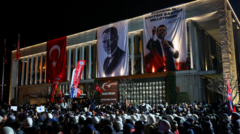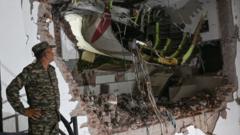In Turkey, thousands have gathered for a seventh consecutive night of protests amid widespread anger over the arrest of political figures, including Istanbul's Mayor Ekrem Imamoglu.
**Protests Surge in Turkey After Arrests of 1,400 Protesters**

**Protests Surge in Turkey After Arrests of 1,400 Protesters**
Massive demonstrations continue as citizens express outrage over political arrests and government crackdown.
In a striking display of civil dissent, thousands of demonstrators across Turkey have taken to the streets for the seventh night since the shocking arrest of Mayor Ekrem Imamoglu, a strong rival to President Recep Tayyip Erdogan. Following Imamoglu’s detention on corruption allegations, which many view as politically motivated, over 1,400 individuals—including students, journalists, and lawyers—have been taken into custody, aggravating tensions within the country.
Rights organizations and the United Nations have decried the instances of violence used by police against peaceful protesters. Speaking during a Ramadan gathering, President Erdogan called for patience during what he termed “very sensitive days” in Turkey’s political landscape, rejecting claims that the arrests were politically charged.
In response to the protests, authorities imposed restrictions in Istanbul, blocking roads and prohibiting gatherings aimed at maintaining public order. Despite these measures, thousands of university students marched through areas known for their activism, chanting demands for government change and displaying banners denouncing the arrests. Young protesters concealed their identities to avoid potential repercussions from law enforcement.
The Republican People's Party (CHP), Turkey's main opposition party, announced their next major rally scheduled for Saturday, aiming to rally support for Imamoglu and advocating for transparency in the government's judicial process. Following a week of escalating protests, the Turkish Interior Minister confirmed that 1,418 demonstrators had been detained, labeling such actions as “illegal.”
Calls for accountability have intensified with journalists facing legal challenges as well. Seven reporters, including an AFP photographer, are currently in court stemming from their coverage of the unrest, prompting international media organizations to challenge the government's crackdown on press freedoms.
Imamoglu, viewed as one of the strongest contenders against Erdogan's two-decade rule, faces additional political risks due to his ongoing legal troubles. Although his arrests do not impede his candidacy, any conviction could prevent him from running in the future. As Erdogan's presidency approaches its constitutional limits, the prospect of early elections looms—heightening security concerns around protests while critics demand adherence to democratic processes.
With a growing crack in the nation's political fabric, citizens continue to rally, bearing witness to Turkey’s tumultuous struggle towards accountability and reform.
Rights organizations and the United Nations have decried the instances of violence used by police against peaceful protesters. Speaking during a Ramadan gathering, President Erdogan called for patience during what he termed “very sensitive days” in Turkey’s political landscape, rejecting claims that the arrests were politically charged.
In response to the protests, authorities imposed restrictions in Istanbul, blocking roads and prohibiting gatherings aimed at maintaining public order. Despite these measures, thousands of university students marched through areas known for their activism, chanting demands for government change and displaying banners denouncing the arrests. Young protesters concealed their identities to avoid potential repercussions from law enforcement.
The Republican People's Party (CHP), Turkey's main opposition party, announced their next major rally scheduled for Saturday, aiming to rally support for Imamoglu and advocating for transparency in the government's judicial process. Following a week of escalating protests, the Turkish Interior Minister confirmed that 1,418 demonstrators had been detained, labeling such actions as “illegal.”
Calls for accountability have intensified with journalists facing legal challenges as well. Seven reporters, including an AFP photographer, are currently in court stemming from their coverage of the unrest, prompting international media organizations to challenge the government's crackdown on press freedoms.
Imamoglu, viewed as one of the strongest contenders against Erdogan's two-decade rule, faces additional political risks due to his ongoing legal troubles. Although his arrests do not impede his candidacy, any conviction could prevent him from running in the future. As Erdogan's presidency approaches its constitutional limits, the prospect of early elections looms—heightening security concerns around protests while critics demand adherence to democratic processes.
With a growing crack in the nation's political fabric, citizens continue to rally, bearing witness to Turkey’s tumultuous struggle towards accountability and reform.




















